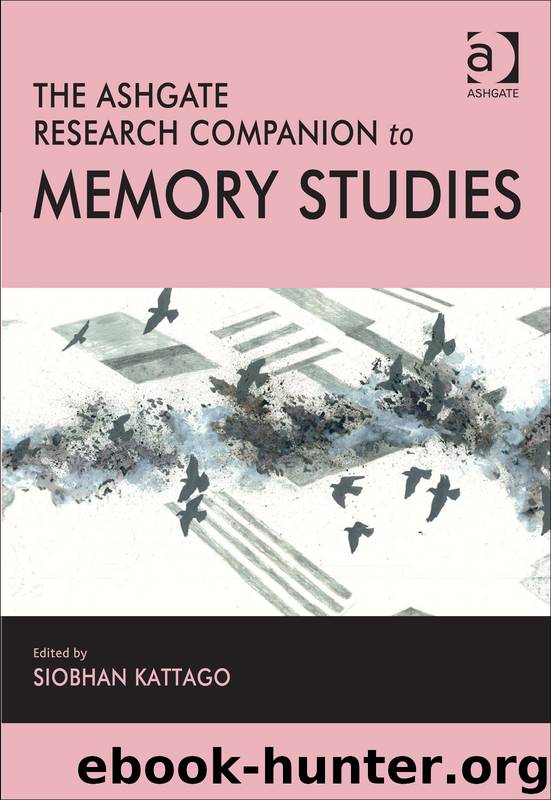The Ashgate Research Companion to Memory Studies by Kattago Siobhan

Author:Kattago, Siobhan
Language: eng
Format: epub
Publisher: Ashgate Publishing Ltd
Published: 2015-03-14T16:00:00+00:00
Concluding Remarks
Juri Lotman developed his semiotic theory of cultural memory under Soviet totalitarianism, where an in-depth study of culture and memory was no mere academic pursuit but inevitably entailed an ethical and political stance. Maxim Waldstein (2008) has rightly noted that in order to understand adequately the work of the Tartu–Moscow school of semiotics, one must not overlook the social and political context of the times. The inevitability of culture for human existence is a leitmotif of Lotman’s work. In 1970, for instance, he wrote unequivocally:
One may assume … that the life of a collective, no matter which collective, is not possible without some kind of culture. For any collective, culture is not merely an optional addition to the minimum requirements for life but a necessary condition for the collective’s very existence. (J.M. Lotman 1970a: 394; Eng. trans. 214)
The precondition for the existence of culture, however, is memory, as Mikhail Lotman has written, following his father’s lead: ‘Without memory there is no culture, nor a personality that could be the subject of culture. Homo culturalis is inevitably homo memor’ (M. Lotman 2013: 264).
As we noted at the outset, in Lotman’s view, semiotics (and science in general) is inseparable from culture. Any analysis of culture is also that culture’s self-analysis, and its main raison d’être is to ensure for that culture the ability of self-cognition and dynamic development. Let us, for example, recall the very last statement from the ‘Theses on the Semiotic Study of Cultures’:
Scientific investigation is not only an instrument for the study of culture but also part of its object. Scientific texts, being metatexts of the culture, may at the same time be regarded as its texts. Therefore any significant scientific idea may be regarded both as an attempt to cognize culture and as a fact of its life through which its generating mechanisms take effect (Ivanov et al. 1973: 525; Eng. trans. Uspensky et al. 1973: 28).
When we add to this declaration another of Lotman’s central ideas, according to which the development of cultural memory is directly linked to social and political processes (‘social decline, as a rule, is accompanied by an ossifying of the mechanism of the collective memory and by an increasing tendency to contract’ [J.M. Lotman and Uspensky 1971: 490; Eng. trans. 217]), it becomes clear that Lotman expected his semiotic study of culture not only to contribute to the development of science, but also to enrich the surrounding cultural environment. I do not think we can be mistaken in assuming that Lotman’s constant emphasis on the autonomy and creativity of culture and cultural texts throughout his work was not merely a theoretical stance but was also political. Quoting Bulgakov’s famous words that ‘manuscripts don’t burn’, he noted in a newspaper article that the resistance of cultural texts is huge: ‘If such forces were applied to the destruction of a tank, it would have been reduced to rubble long ago’ (J.M. Lotman 1993: 293). Lotman’s own texts undoubtedly constituted a very important mechanism of
Download
This site does not store any files on its server. We only index and link to content provided by other sites. Please contact the content providers to delete copyright contents if any and email us, we'll remove relevant links or contents immediately.
| Administration & Medicine Economics | Allied Health Professions |
| Basic Sciences | Dentistry |
| History | Medical Informatics |
| Medicine | Nursing |
| Pharmacology | Psychology |
| Research | Veterinary Medicine |
The Art of Thinking Clearly by Rolf Dobelli(10459)
The 5 Love Languages: The Secret to Love That Lasts by Gary Chapman(9794)
Mindhunter: Inside the FBI's Elite Serial Crime Unit by John E. Douglas & Mark Olshaker(9327)
Becoming Supernatural by Dr. Joe Dispenza(8205)
Nudge - Improving Decisions about Health, Wealth, and Happiness by Thaler Sunstein(7695)
The Road Less Traveled by M. Scott Peck(7595)
Mastermind: How to Think Like Sherlock Holmes by Maria Konnikova(7326)
Enlightenment Now: The Case for Reason, Science, Humanism, and Progress by Steven Pinker(7308)
Win Bigly by Scott Adams(7185)
The Way of Zen by Alan W. Watts(6606)
Factfulness: Ten Reasons We're Wrong About the World – and Why Things Are Better Than You Think by Hans Rosling(4737)
The State of Affairs by Esther Perel(4713)
Gerald's Game by Stephen King(4642)
Man's Search for Meaning by Viktor Frankl(4586)
The Confidence Code by Katty Kay(4252)
Thinking in Bets by Annie Duke(4218)
The Healing Self by Deepak Chopra(3568)
Hidden Persuasion: 33 psychological influence techniques in advertising by Marc Andrews & Matthijs van Leeuwen & Rick van Baaren(3560)
The Worm at the Core by Sheldon Solomon(3486)
